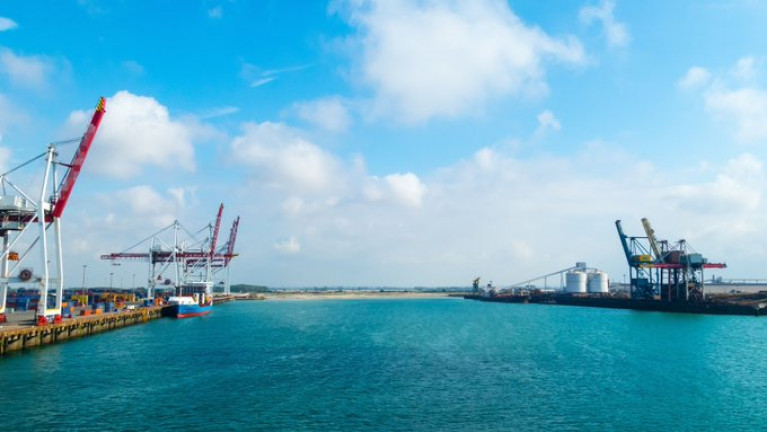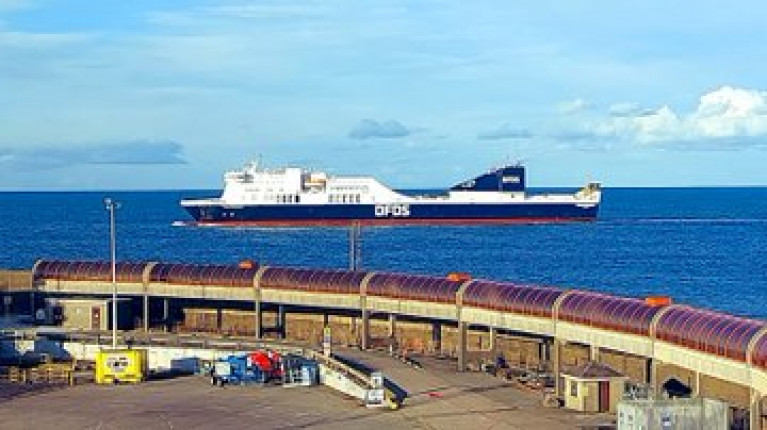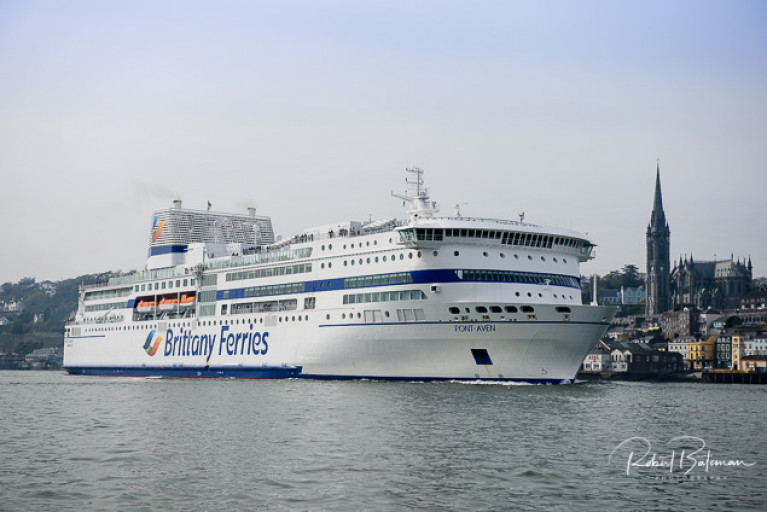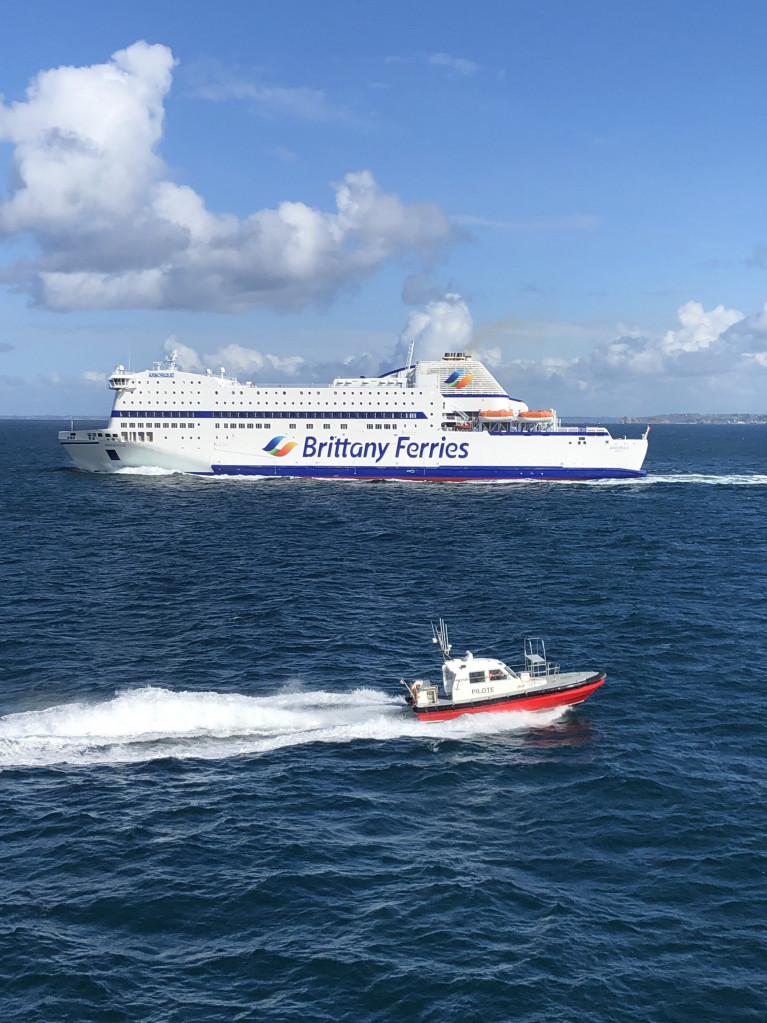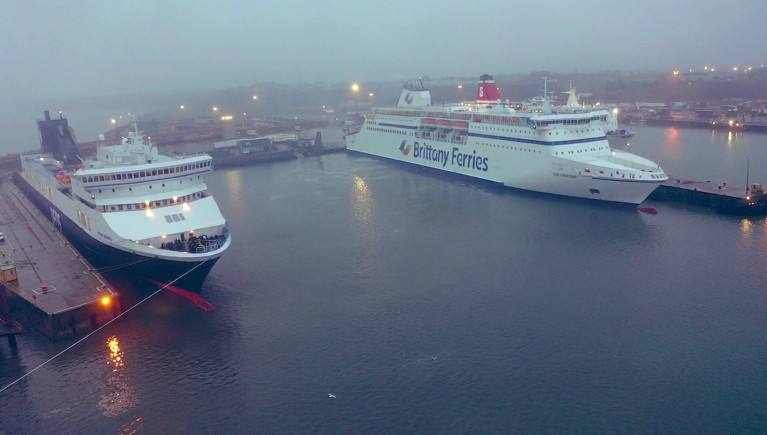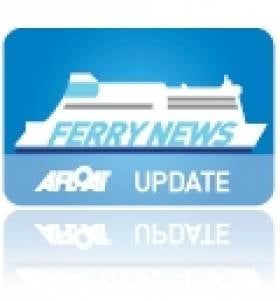Displaying items by tag: IrelandFrance
Stena Line Achieves Record Summer Volumes on Ireland-France Route of Rosslare-Cherbourg
Ferry operator Stena Line has just recorded its busiest summer on their Ireland-France route with passenger and car numbers up over 90% on last year.
The introduction of Stena Vision on the Rosslare-Cherbourg service in June has helped to drive passenger volumes, but the Irish Sea’s largest ferry operator believes the figures also pay testimony to the increasing popularity of France as a destination of choice for the Irish market.
Paul Grant, Stena Line’s Trade Director (Irish Sea) said: “Even before the pandemic the popularity of the Rosslare-Cherbourg service was growing so we were always confident that adding an extra vessel to the route would prove popular with new as well as existing customers. The Stena Vision has helped Stena Line extend our customer service offering in terms of capacity and the range of facilities available onboard. With two ships operating on the route, this is now the most frequent service from Ireland to France offering six sailings each way per week.”
The addition of Stena Vision to the Ireland-France route provided Stena Line with a significant increase in capacity operating alongside Stena Horizon.
Stena Vision has space for 1,300 passengers, with 485 passenger cabins, more than any other ferry currently sailing from Ireland. It offers a wide selection of accommodation ranging from standard cabins to deluxe suites, as well as 42 pet friendly cabins.
The cruise ferry is also equipped with a choice of restaurants, Sky Bar with live entertainment, outdoor sun deck bar and Happy World kids play area. Guests can also avail of a Pure Nordic Spa which includes a sauna and jacuzzi.
Paul Grant added: “The introduction of Stena Vision has also been positive for the freight sector, which has seen demand grow for direct services to France since Brexit. Stena Vision has also increased driver accompanied capacity with more single occupancy cabin space for freight drivers.”
Stena Line is the largest ferry operator on the Irish Sea, with the biggest fleet, up to 238 weekly sailings offering the widest choice of routes including, combined passenger and freight services from Belfast to Cairnryan and Liverpool, Dublin to Holyhead, and Rosslare to Fishguard in addition to Rosslare to Cherbourg.
The company also runs a dedicated freight only route from Belfast to Heysham.
Irish Minister Opens New Dunkirk Terminal As Connections on Ireland-France Routes Reach 44
Minister for European Affairs, Thomas Byrne, is today inaugurating a new Irish terminal at the French ferry port of Dunkirk, with Ireland-France shipping routes rising from 12 before Brexit to 44 now.
It has already handled nearly 50,000 freight units (trucks and un-accompanied containers) moving from Rosslare Europort and back, as exporters side step the UK landbridge since Brexit took effect on 1 January.
"It's basically sold out now with freight lorries," said Minister Byrne.
"The whole port, the [Nord Pas de Calais] region, the [Dunkirk] chamber of commerce, is behind this, to get even more connections to Ireland.
"We only had 12 direct routes to France before Brexit, now it’s 44," he added.
"We are looking as well next summer towards tourism to get Irish tourists into this region, but also of course, tourists from Northern France, Belgium, Holland and Germany. They have more direct routes into Ireland too."
Further reading RTE News reports including the Minister's response to the Northern Ireland protocal.
In addition Afloat's coverage of the latest development of DFDS's Rosslare-Dunkirk route. The direct route to the EU which started the day after Brexit was officialy implemented.
Regina's Rosslare Europort Debut Boosts Brexit-Buster Capacity by 30% on Ireland-EU Route
Regina Seaways is the latest freight-only ferry to serve DFDS Rosslare Europort-Dunkirk 'Brexit-buster' route, having this month begun service on the direct link to the continental mainland, writes Jehan Ashmore.
The debut of Regina Seaways further increases capacity to 30% on the Ireland-France route which is operated by the Danish shipping and logistics company.
In addition with the introduction of Regina Seaways, having replaced Kerry, brings a new timetable where the ropax along with the chartered-in Visby, which also has a higher speed, will reduce passage times.
The changed DFDS timetable means that instead of three vessels running simultaneously, this is now reduced to these two freight-ferries.
Since the Ireland-EU route started more than 9 months ago, the route has employed several vessels to bypass post-Brexit Britain, thus enabling lorry drivers to avoid customs paperwork, restrictions and potential delays. Freight on the route also includes provision for un-accompanied trailers.
The DFDS owned Optima Seaways which launched the inaugural sailing on 2nd January, also saw another fleetmate, Ark Dania employed on the route, though both vessels have move on. The former Afloat tracked with a return to the Baltic Sea while the latter vessel is in Greek waters.
Regina Seaways marks the seventh ship so far to serve the route, whereas with exception of the DFDS pair, the rest of the vessels were all chartered-in.
The charters involved Drotten (sister of Visby) which came from Swedish operator, Destination Gotland, Kerry from Stena RoRo and Pelagos from French operator Méridionale.
With non-essential international travel set to reopen for Ireland from 19th July, Brittany Ferries is today urging holidaymakers to factor in the many good reasons why ferry travel is the best option for travelling abroad this summer.
- Early Irish bookings already look promising but plenty of space still available
- No mingling in crowded terminals: drive on board where social distancing comes as standard
- North west France offers an array of different holiday options in unpopulated areas
The French ferry company, whose main passenger service in Ireland operates the Cork-Roscoff route, says booking numbers are looking positive with over 600 passengers due to travel from Cork on flagship cruise ferry, Pont-Aven on Saturday, 24th July. The operator says there is still plenty of availability for anyone looking to get away this summer.
 Pont Aven passes Roches Point in July 2021 Photo: Bob Bateman
Pont Aven passes Roches Point in July 2021 Photo: Bob Bateman
“We want to remind people of all the great reasons to travel by ferry this summer,” said Hugh Bruton, Brittany Ferries General Manager for Ireland.
“Taking the ferry means there’s no need to mingle in a busy terminal building, or arrivals hall, alongside passengers from multiple destinations. Drive on-board in your own car, then head straight to a cabin which is fed by fresh sea air. Step outside on deck, visit a bar, restaurant or shop, and do so while social distancing in safety and comfort. This is the modern ferry experience and it’s why we urge everyone to consider a sail-and-stay holiday in 2021.”
Roscoff offers a gateway to north west France and Brittany Ferries stresses that anyone concerned about holidaying in big cities or busy resorts, should be reassured that you will not be arriving in population centres, but rural regions characterised by sweeping beaches, coastal paths and ancient forests.
New Services As Brittany Ferries Introduce Three Weekly 'Freight' Sailings On Ireland-France Links
Operator Brittany Ferries has announced that it is introducing three new weekly 'freight' only sailings between Ireland and France as the company previously alluded.
The sailings will begin this Thursday, 4th February on a (new route) linking Rosslare Europort and St Malo.
The first of two (new sailings) out of Cork to Roscoff will begin this Saturday.
These sailings are in addition to the current Brittany Ferries sailings out of Cork and Rosslare to both France and Spain. The new sailings are in response to demands from both Irish and French hauliers seeking a more direct route.
Normally most lorries travelling between Ireland and France transit via the UK, using ferry services across the Irish Sea and English Channel. However, since new post-Brexit trade rules were introduced on January 1st increasing numbers of Irish and continental hauliers have been deterred from using this ‘landbridge’ due to increased customs checks and paperwork.
- Company responds to demand for more direct Ireland France freight links
- New route: Rosslare - St Malo (sailings begin this week on Thursday)
- Two new sailings on Cork - Roscoff (begins on Saturday)
- First freight only services for Ireland from Brittany Ferries
- (Afloat adds further new routes: Rosslare-Roscoff /Cork-St.Malo with the latter as referred below).
Hugh Bruton, General Manager, Brittany Ferries Ireland, commented: “It’s clear that Brexit has distorted flows of trade between France and Ireland, there’s now clear and compelling demand both in Brittany and beyond to boost freight capacity direct from the region to Ireland. And Irish traders too are seeking direct links to Western France. We’re always listening to our haulier customers in order to best meet their needs and we look forward to restarting Brittany-Ireland services two months earlier than planned.”
The new Brittany-to-Ireland sailings come in addition to an extra weekly Rosslare to Cherbourg round trip which was introduced in mid-January. This means that from February Brittany Ferries will offer hauliers a choice of eight sailings a week in each direction between Ireland and France.
The company also offers two weekly roundtrips between Rosslare and Bilbao, northern Spain. Altogether the company will be offering 12 sailings a week linking Ireland with France and Spain.
Conor Mowlds, Chief Commercial Officer, Port of Cork said: “The decision by Brittany Ferries to operate two freight only services from Cork to St Malo and Roscoff is hugely positive for Cork. Importers and exporters now have further transport options to get their freight direct to the EU and bypass the UK Land-Bridge. This announcement comes in the same month as we announced a second freight service from Cork to Zeebrugge. These direct freight services from Cork to the EU strengthen the region by offering more flexibility to Irish customers, ensuring supply chains are maintained. Our relationship with Brittany Ferries spans over 40 years and it continues to go from strength to strength. We wish them every success with this freight service.”
Glenn Carr, General Manager, Rosslare Europort adds: “The continuing commitment of Brittany Ferries to develop new services linking Irish industry to the European continent is once again demonstrated with this new service connecting to St Malo and Roscoff. We have worked closely with Brittany Ferries to facilitate this new service, which will give further choice and capacity alongside existing Brittany Ferries services between Rosslare Europort and Bilbao and Cherbourg.”
These new freight only routes will operate until the end of March, when scheduled freight and passenger services will resume between Cork and Roscoff. With two weekly sailings in each direction, frequency has been doubled for 2021.
Ireland-France Hauliers Will Need Negative Covid-19 test from Thursday
Hauliers travelling to France from Ireland will have to have evidence of a negative Covid-19 test from Thursday.
The development follows a decision of the French government.
As a result, the Irish Government says the testing protocol will apply to drivers travelling on any ferry leaving Ireland for France after 11pm tomorrow.
"The Department of Transport, in conjunction with Transport Infrastructure Ireland and Wexford County Council, is working extensively to finalise the opening of State-supported antigen testing facilities for hauliers," the department said in a statement.
"These tests will be made available free of charge at dedicated testing sites near the ports of Dublin and Rosslare."
RTE News has more on the development.
Bosses of the ferry industry, have ruled out increasing their services between Ireland and France in the coming months and have even indicated that passenger numbers on their routes could be reduced to facilitate social distancing.
There had been speculation that ferries could receive a boost in passenger numbers as more people opt to travel by sea rather than by air over Covid-19 fears.
Skibbereen resident David Puttnam also told The Southern Star’s Coronavirus Podcast this week that the idea of another passenger ferry from Cork should probably be ‘looked at again’ in light of the number of people who are unlikely to use air travel in the foreseeable future.
But Brittany Ferries, who operate the Cork to Roscoff route, have already said that they have no plans to extend services.
‘The company is looking forward to welcoming passengers back onboard the Pont-Aven once it is in a position to re-open its Cork to Roscoff route,’ said a spokesperson.
They have already cancelled all passenger sailings from Ireland to France and Spain up to June 15th.
Christophe Mathleu, chief executive officer of Brittany Ferries, said that difficult decisions have to be made to ensure those services comply with WHO guidelines and our the company’s own safety protocols.
‘Passenger numbers will have to be considerably limited and several on board services will be subject to change to ensure they are safe but still enjoyable,’ he said.
The company’s decision earlier this year to close down its Cork to Santander route – after just two years – shocked many in the tourist industry.
For much more on this story effecting the Munster region, click here.
Seasonal Services Set Sail ‘Four’ France
Also operating on the same route to Normandy are Celtic Link Ferries which run the modern sleek Italian built 800 passenger /200 vehicle ro-pax ferry Norman Voyager. Short wine breaks are from €200 return for a car, driver and a two-berth outside cabin. Additional passengers can travel for €10 each way and subject to sailing schedules passengers can stay in Cherbourg for up to five hours.
A third operator to France is Brittany Ferries which sails on the Cork-Roscoff route and which is served by their 'flagship' Pont-Aven. The €100m ferry has a swimming pool and this is unique to any route operating out of Ireland. The company are offering one-way fares from €70 per person based on a car with four adults in an inside cabin.
Sailings depart Saturday's from Cork and arrive in the Breton port 14 hours later, making the route the shortest and fastest of the four continental services.


























